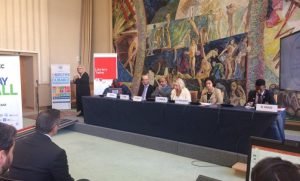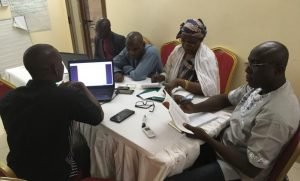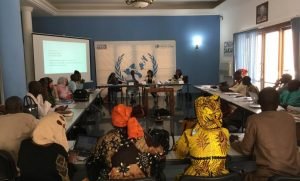On 2–3 April 2025, the Global Disability Summit in Berlin brought together more than 4,700 participants—including government representatives, civil society organizations, experts, and advocates—to explore the transformative potential of disability inclusion. The summit concluded with the adoption of the Amman-Berlin Declaration on Global Disability Inclusion, a landmark document outlining a comprehensive, human rights-based framework to ensure persons with disabilities are fully and equally integrated into every facet of public life.
Despite the clear mandate and robust commitments in the Declaration, fewer than 20 African governments have endorsed it to date. Given Africa’s potential to benefit significantly from a disability-inclusive development agenda, this advocacy brief calls on all African governments, intergovernmental bodies, and key stakeholders to join the global movement by endorsing the Declaration and taking decisive, meaningful action.
African nations are uniquely positioned to lead on disability inclusion by leveraging regional solidarity and embracing the principles embodied in the Declaration. These principles include:
- Upholding International Human Rights Commitments:
The Declaration builds on the near-universal ratification of the Convention on the Rights of Persons with Disabilities (CRPD). Endorsing the Declaration signals a renewed and unequivocal commitment to ensuring that persons with disabilities enjoy the same rights and opportunities as others. - Accelerating National Development:
Disability-inclusive policies are not only about rights—they are key drivers of social and economic progress. Inclusive development and humanitarian programming allow nations to harness the full potential of all citizens, spurring innovation and reducing poverty and inequality. - Advancing the Sustainable Development Goals (SDGs):
The global pledge to “leave no one behind” is intrinsically linked to disability inclusion. African countries are urged to embed these values in their national and regional development strategies to accelerate progress toward the SDGs. - Enhancing Disaster, Conflict, and Crisis Response:
In a world marked by increasingly frequent crises—natural disasters, conflicts, and health emergencies—ensuring humanitarian responses are inclusive and accessible to persons with disabilities is essential for protecting vulnerable populations.
Key Commitments of the Amman-Berlin Declaration
The Declaration outlines pivotal commitments that serve as benchmarks for national policy, including:
- Inclusion of Disability in International and National Programs:
Governments commit to making all international development programs accessible to persons with disabilities and aligned with non-discrimination and equal opportunity principles. - The “15 Percent for the 15 Percent” Initiative:
This commitment calls for dedicating at least 15% of development and humanitarian funding to disability inclusion, ensuring equitable access and targeted investments. - Meaningful Participation of Organizations of Persons with Disabilities (OPDs):
The Declaration reinforces the importance of including OPDs in the planning, design, and evaluation of all relevant policies and programs, ensuring decisions are informed by lived experience. - Addressing Intersectional Discrimination:
The Declaration emphasizes dismantling barriers faced by groups experiencing multiple forms of discrimination—including women, children, and youth with disabilities—through intersectional policy approaches. - Multi-Stakeholder Partnerships:
It calls for active collaboration among governments, civil society, the private sector, academia, and trade unions to pool resources, drive research, and foster innovation in disability inclusion. - Data-Driven Policy Making:
The Declaration underscores the importance of robust data collection and evidence to inform policy design, implementation, and monitoring in both development and humanitarian contexts.
Why Must Africa Endorse the Declaration?
By endorsing the Declaration, African governments can unlock numerous benefits:
- Strengthened Human Rights Protections:
Endorsement signals that the rights of persons with disabilities are a national priority, fulfilling international obligations and accelerating domestic legal and policy reforms. - Enhanced Social and Economic Opportunities:
Inclusive approaches build more diverse and productive societies. Empowering every citizen to contribute fully strengthens economies and fosters resilience. - Improved Crisis Management and Resilience:
Inclusive disaster risk reduction and humanitarian responses ensure that no one is left behind during crises, making societies more adaptive and prepared. - Catalyzing Pan-African Solidarity:
With only a handful of African nations having endorsed the Declaration, a united and coordinated continental response is urgently needed. Endorsement demonstrates leadership and sets a standard for best practices across the continent.
Urgent Actions for African Governments and Stakeholders
ADF urges all African governments, regional bodies such as the African Union, and stakeholders across development, humanitarian, and civil society sectors to:
- Publicly Endorse the Amman-Berlin Declaration:
Join the growing number of governments committed to this progressive agenda. A formal endorsement will affirm your nation’s leadership in advancing disability rights. - Integrate Disability Inclusion into National Legislation and Policies:
Translate the Declaration’s principles into concrete actions by revising laws, budgets, and development plans to ensure disability inclusion is central to national agendas and international partnerships. - Strengthen Support for OPDs:
Provide the resources and platforms OPDs need to engage meaningfully in decision-making processes. Establish structured mechanisms for collaboration between government bodies and OPDs. - Commit Resources to the “15 Percent” Target:
Allocate or reallocate funding to ensure at least 15% of development and humanitarian efforts address disability inclusion, aiming for full implementation by 2028. - Foster Multi-Stakeholder Collaboration:
Build strategic alliances among government, civil society, academia, and the private sector to share best practices, drive innovation, and mobilize funding for inclusive programs. - Implement Rigorous Data Collection and Monitoring:
Develop systems to capture, analyze, and report on disability inclusion efforts. Data-driven monitoring will strengthen accountability and improve policy outcomes over time.
Together, let us build an Africa—and a world—where no one is left behind.






